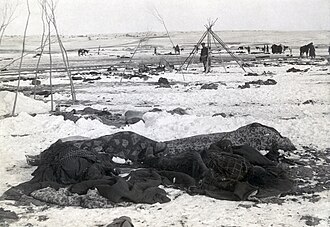
- Details
- By Native News Online Staff
On Friday, the National Congress of American Indians (NCAI) pushed back on the U.S. Department of Defense’s (DoD) decision to retain the Medals of Honor awarded to soldiers involved in the Wounded Knee Massacre on December 29, 1890. This decision announced on Thursday disregards the well-documented truth of a brutal, unprovoked massacre carried out by the 7th Cavalry against the Lakota people—and ignores the moral obligation to confront past injustices with integrity.
Wounded Knee was not a “battle.” It was the deliberate mass killing of more than 350 unarmed Lakota men, women, and children who had sought refuge at Wounded Knee Creek. Contrary to Secretary of Defense Pete Hegseth’s claim that these medals are “no longer up for debate,” the event is widely recognized as a historical atrocity. This includes acknowledgment by historians, Tribal Nations, and even the U.S. Senate, which expressed its regret through Concurrent Resolution 153 in 1990. By preserving these medals, the DoD perpetuates the injustice and deepens the pain felt by the victims' descendants and Native communities across the country.
“Honoring those involved in the Wounded Knee Massacre with the United States’ highest military award is incompatible with the values the Medal of Honor is meant to represent,” said Larry Wright Jr., NCAI Executive Director. “Celebrating war crimes is not patriotic. This decision undermines truth-telling, reconciliation, and the healing that Indian Country and the United States still need.”
These medals should never have been awarded. In 2024, the DoD initiated a formal review of the medals, but despite decades of advocacy by tribal nations, historians, and members of Congress, this week’s announcement confirms the medals will remain. NCAI stands in solidarity with the Lakota Nations, Tribal communities, Native veterans, and active-duty service members—who serve the United States at higher rates than any other demographic—calling for the correction of the historical record and the alignment of our highest honors with our highest principles.
NCAI echoes the powerful voices of tribal leaders whose communities continue to bear the intergenerational trauma of this horrific event.
“Secretary Hegseth’s decision is another act of violence against our Lakota people,” said Chairwoman Janet Alkire, Standing Rock Sioux Tribe. “The Wounded Knee Massacre was an unprovoked attack on men, women, children and elders who had been rounded up by the military. As Indian people, we know what bravery and sacrifice means. We serve in the military at greater rates than any other group in the United States. I served in the Air Force with men and women who were brave and served with honor. The actions at Wounded Knee were not acts of bravery and valor deserving of the Medal of Honor. There is nothing Hegseth can do to rewrite the truth of that day.”
“The Wounded Knee Massacre was one of the darkest days in U.S. history,” added Chairman Ryman LeBeau, Cheyenne River Sioux Tribe. “The U.S. Cavalry stopped our people out on the high plains, surrounded them with guns and cannons, disarmed them, opened fire, and murdered them. Women and children were chased down and shot in the back. This is one of America’s darkest days and the medals must be revoked. They tarnish America’s Medals of Honor. There is no honor in murder. Secretary Pete Hegseth made this decision on his own concurrence with no contact or request for consultation to the Tribes.”
NCAI calls on the Department of Defense to immediately release the findings of the review that led to this deeply flawed and ahistorical decision. The DoD must reverse course and engage directly with NCAI and the leaders of the Great Plains Tribal Chairman's Association. In addition, we urge Congress to pass the “Remove the Stain Act” to ensure the Medal of Honor reflects true courage—not cowardice and cruelty—and that our nation’s history is preserved with honesty and respect.
More Stories Like This
Native News Weekly (August 25, 2024): D.C. BriefsUS Presidents in Their Own Words Concerning American Indians
Michigan Attorney General Opens Criminal Investigation into Indian Boarding Schools
Next on Native Bidaské: Julian Brave NoiseCat on the Lumbee Nation’s 140-Year Fight for Federal Recognition
Hackers Compromise Native News Online Facebook Page
Help us defend tribal sovereignty.
At Native News Online, our mission is rooted in telling the stories that strengthen sovereignty and uplift Indigenous voices — not just at year’s end, but every single day.
Because of your generosity last year, we were able to keep our reporters on the ground in tribal communities, at national gatherings and in the halls of Congress — covering the issues that matter most to Indian Country: sovereignty, culture, education, health and economic opportunity.
That support sustained us through a tough year in 2025. Now, as we look to the year ahead, we need your help right now to ensure warrior journalism remains strong — reporting that defends tribal sovereignty, amplifies Native truth, and holds power accountable.
 The stakes couldn't be higher. Your support keeps Native voices heard, Native stories told and Native sovereignty defended.
The stakes couldn't be higher. Your support keeps Native voices heard, Native stories told and Native sovereignty defended.
Stand with Warrior Journalism today.
Levi Rickert (Potawatomi), Editor & Publisher


